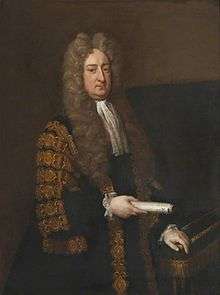3rd Parliament of Great Britain
The 3rd Parliament of Great Britain was summoned by Queen Anne on 27 September 1710 and assembled on the 25 November 1710. Under the Triennial Act, the Parliament was due to expire, if not dissolved sooner, at the end of the term of three years from the first meeting. In the event it was actually dissolved on 8 August 1713.
| 3rd Parliament of Great Britain | |||||||
|---|---|---|---|---|---|---|---|
| |||||||
 William Bromley, Speaker of the House of Commons | |||||||
| Overview | |||||||
| Term | 27 September 1710 – 8 August 1713 | ||||||
| Government | |||||||
| House of Commons | |||||||
| Members | 558 MPs | ||||||
| Speaker of the House of Commons | William Bromley | ||||||
| House of Lords | |||||||
| Lord Keeper of the Great Seal | Baron Harcourt | ||||||
| Leader of the House of Lords | |||||||
| Sessions | |||||||
| |||||||
The new House of Commons comprised 346 Tories, 196 Whigs and 14 others, which represented a Tory landslide.[1] This was largely due to anti-Government feelings caused by the trial of Henry Sacheverell for verbally attacking dissenters and a growing anti-war sentiment. William Bromley, Member of Parliament for Oxford University, was installed as Speaker of the House of Commons.
Initially Robert Harley as Chancellor of the Exchequer and head of the Queen's Ministry had problems in controlling the High Church Tories who were now dominant but a failed attempt by Antoine de Guiscard to assassinate him increased his popularity. However whilst he was recovering the Tories pushed through a bill to build 50 new churches in London (the New Churches in London and Westminster Act 1710). On his return Harley demonstrated his political and financial ability when he successfully obtained Parliamentary approval to establish the South Sea Company as a means of raising some £9 million to pay off Government debt. Shortly before the first session ended the Queen elevated Harley to the peerage as Earl of Oxford and promoted him to Lord Treasurer.
At the start of the second session the terms of a peace deal with France were defeated by the Whigs. Harley created 12 new Peers in the House of Lords to forestall a similar problem there. In the new year (1712) Parliament was busy on dealing with proceedings against the Duke of Marlborough, which led to his dismissal from his position as Captain-General, and against Robert Walpole on trumped up charges of embezzling public funds. Walpole was expelled from the Commons and committed briefly to the Tower of London. Harley then adroitly engineered condemnation of Britain's allies in the peace talks and by the end of the second session had got decisive backing for his policy of acting alone.
Completing the terms of the Treaty of Utrecht delayed the third session until April 1713. When it did reconvene there were open splits in the Tory party on a number of issues. Viscount Bolingbroke, a Secretary of State, took the opportunity to seek the leadership of the Party.
The Parliament was dissolved on 8 August 1713.
Notable Acts passed in the Parliament
- New Churches in London and Westminster Act 1710
- Gaming Act 1710
- Lease of Exeter Castle Act 1710
- Municipal Offices Act 1710
- Toleration Act 1711 (aka Occasional Conformity Act)
- Princess Sophia's Precedence Act 1711
- Scottish Episcopalians Act 1711
- Naturalization Act 1711
- Church Patronage (Scotland) Act 1711
- Churches in London and Westminster Act 1711
- East India Company Act 1711
- Pleading Act 1711
- West Riding Inclosures. Act 1712
- Moss Troopers Act 1712
- Mortuaries (Bangor, &c.) Abolition Act 1713
- Established Church Act 1713 (aka Schism Act)
- Simony Act 1713
- Presentation of Benefices Act 1713
- Discovery of Longitude at Sea Act 1713
- Repair of Breach in Thames Bank at Dagenham: Coal Duties Act 1713
See also
- 1710 British general election
- List of MPs elected in the British general election, 1710
- List of Acts of the Parliament of Great Britain, 1707–19
- Oxford-Bolingbroke ministry
- List of Parliaments of Great Britain
Sources
- "The 3rd Parliament of Great Britain". History of Parliament Online. Retrieved 8 November 2017.
External links
- "Third Parliament of Great Britain: First session - begins 25/11/1710". British History Online. Retrieved 8 November 2017.
| Preceded by 2nd Parliament of Great Britain |
3rd Parliament of Great Britain 1710–1713 |
Succeeded by 4th Parliament of Great Britain |
